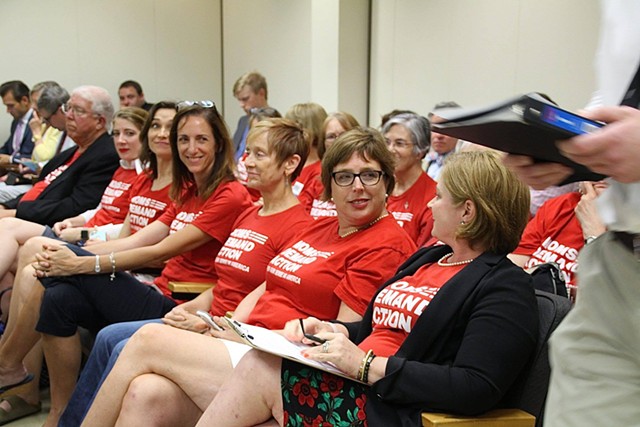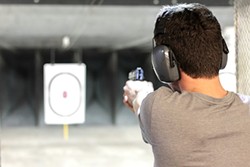Imagine for a moment that you're at a concert in Charlotte at one of any number of small-to-midsize venues that don't explicitly prohibit guns inside by posting a sign at the door. Shots ring out at the other side of the venue, some disagreement near the bar that escalated far too quickly. You instinctively move toward the exit to get away.
What you don't realize is that between you and that exit is a group of teenagers, and now to everybody's surprise, they're returning fire in the interest of saving innocent lives. These are the good guys with guns you hear so much about, waiting in the wings with weapons concealed ready to play hero if they're needed.
There's one big problem, however, and it's a terrifying one: none of these teens has ever fired a gun — save for playing Call of Duty on their PlayStation 4 — and their first experience with doing so is in a dark room under chaotic conditions, with your life at stake.
Nobody knew this group of newly minted adults fresh out of high school was packing, and if they had known, most folks would have been out of that exit long ago, but they were kept in the dark, literally and figuratively, and could very well die in the dark because of a new law that lowered the age for folks allowed to carry concealed handguns and did away with certain provisions that ensured those carrying them would know how to handle them.
The story told above is an obviously far-fetched hypothetical one. You're no more likely to be cut down by confused gamers with guns while watching your favorite local band than you are to fall victim to a mass shooting in Walmart at the hands of some radical extremist because government regulation has disarmed you (neither is going to happen), and yet it's reminiscent of the type of fear mongering Republican lawmakers have used to try to pass laws like the one described above which passed through the N.C. House on Thursday, June 8, in a 64-51 vote.
Among other things, House Bill 746 — also known as the Omnibus Gun Changes bill — would do away with the mandatory concealed carry permitting process, allowing anyone 18 and over to carry a gun hidden in their clothes.
While gun control advocates and law enforcement agencies across the state have taken strong stances against the bill, Republicans such as Chris Millis of Pender County have simply insisted that opponents haven't read the bill, while Rep. John Blust of Guilford County tweeted a drawing of "bad guy" stick figures pointing guns at unarmed "good guys" to explain how we are all in imminent danger if we're not all armed.
Christy Clark of Huntersville is the North Carolina chapter leader for Moms Demand Action for Gun Sense in America, a group created to lobby legislators, companies and educational institutions for gun reform.
Clark is involved with the local Charlotte group, and along with leaders from more than 10 chapters across the state has been encouraging supporters to call their local representatives and speak against HB 746 since its inception.

- Photo courtesy of Christy Clark.
- Christy Clark (far right) and other members of Moms Demand Action North Carolina chapter say they will continue to show up in Raleigh on a daily basis to fight against HB 746.
Clark said her biggest concern is the elimination of a mandatory concealed carry permitting process, which mandates that gun owners go through eight hours of safety training before receiving the permit.
"Our main issue with the bill is that it will repeal the requirement for the people to have safety training, and that would allow people to carry hidden, loaded guns in public places with no safety training and possibly never having even fired a gun ever," she said.
To be clear, North Carolina is an open-carry state, meaning gun owners 18 years old and up can already carry a gun in plain sight without having gone through any permitting process. Current law states that a person has to be 21 or older to obtain a concealed carry permit.
Carrying any gun — openly or concealed — is restricted for people who are otherwise prohibited from owning a gun for reasons that include having been convicted of a felony or having been deemed mentally unfit to own a gun. That would remain so under HB 746.
For Clark, the existing open-carry laws don't justify the creation of relaxing concealed carry laws that were working fine.
"It is concerning that now they like to say, 'Oh well it's going to be where people can already carry guns, because open carry is allowed there already,'" she said. "My issue with that is that we shouldn't be allowing more people to carry guns without safety training. We want to make North Carolina more safe, not less."
John Rudisill, a Charlotte attorney who's involved with multiple anti-gun organizations including Everytown for Gun Safety, has been watching in dismay as the bill has already moved further through the state legislature than previous efforts to eliminate the concealed carry permitting process.
"This bill is the triumph of sheer lunacy in the name of fear ideology," Rudisill said. "All the law enforcement organizations are against it, and the only parties that will benefit from it are the funeral homes and the hospitals, both of whom have enough business."
As Rudisill mentioned, gun control advocates are not alone in their opposition to HB 746. Law enforcement agencies across the state have been overwhelmingly against the bill, stating that it will put both police officers and residents in greater danger.
Two of the state's largest three police associations — the North Carolina Association of Police Chiefs and the North Carolina Fraternal Order of Police — have taken official stances against the bill. The third, the North Carolina Sheriffs' Association (NCSA), has not officially endorsed or denounced the bill, although the organization has stood against earlier efforts to repeal the concealed carry permitting process, and its leadership has been openly critical of HB 746.
In a legislative report released June 2, the NCSA noted that one aspect of the new law would require that people applying for a concealed carry permit (permits would still be available for reasons that include helping along the process of purchasing a firearm) to have a current diagnosis or ongoing mental disorder to be denied a permit. As it stands now, the sheriff's office has access to any available mental health evaluations and mental health orders for applicants, and analyzes them before deciding if that applicant can obtain a permit.
"This proposed change has the potential to allow individuals with serious mental illnesses who have not yet been diagnosed to be eligible for a concealed handgun permit," reads the NCSA report.

- If passed as law, HB 746 would eliminate the need for the eight hours of training that comes along with obtaining a concealed carry permit. (Photo by Jazzy Geoff/iStock.)
Christopher Kopp, a sergeant with the Charlotte Mecklenburg Police Department and owner of Lockdown International, for which he travels the country teaching classes related to gun safety in active shooter situations, explained why the law is viewed by many as being unsafe for police officers.
"For us to stop and frisk somebody, we have to have a legitimate fear that they're possibly carrying, that they're armed, and we have to articulate why we felt we had to pat them down," Kopp said. "Now, if it's legal to carry concealed, that takes away law enforcement's ability to what I would consider deescalate a situation. It can quickly turn a voluntary contact into a very dangerous situation."
Kopp, who spoke with Creative Loafing not as a representative of the CMPD but as a business owner familiar with gun safety, downplayed the effects of cancelling the permitting process, which includes safety training.
"Everybody goes through the training, but you only go through eight hours once every five years," Kopp said. "Think of the last eight-hour training session that you've gone to. Five years later, do you remember everything that was told to you? Even our current concealed policies that we have in the state are kind of subpar."
Kopp believes it's up to each gun owner to educate themself on gun safety and to do it consistently.
"It really comes down to the individual themselves actively going out there and training themselves with it," he said. "If you're going to carry the gun, no matter if you go to get a [concealed carry permit] or you want to open carry it, you better know how to use it for safety purposes."
Carolina Sporting Arms offers the eight-hour classes currently required for someone to get a concealed carry permit, but store manager Donald Ingram isn't as concerned with the potential loss of revenue as he is with bolstering the rights of his customers.
"They're basically saying constitutionally you should have the right to carry a concealed weapon if you're legal to do so — permit or otherwise," Ingram said. "It allows you to do that without jumping through the hoops of the permit. So I'm OK with it, and most people in the industry are for it."
Ingram agreed with Kopp that the responsibility of educating one's self should fall on the individual, rather than the mandates of the government.
"Regardless of whether [HB 746] goes though or whether it's changed, in anything we all do, it's incumbent upon you as a participant to be as educated as you can about it," Ingram said.
"I guess you could say there's the potential of someone carrying without knowing the legal ins and outs — what they can and can't do — and if they don't take that responsibility, they'll pay the cost for violating the law."
It's still unclear whether HB 746 will pass through the Senate, and if it does, Gov. Roy Cooper may still shoot it down. Cooper has voiced mild concern with the bill, but has not stated whether he plans to veto it should it pass through the N.C. Senate.
Judging by the margin with which it passed though the House, it does not currently seem as if the bill could survive a veto. However, it's a safe assumption that if (or when) Republicans miss the mark on this one — as has been the case before — they'll only keep firing.
[Editor's Note: The original headline has been changed, as it referred to "eliminating" the concealed carry permitting process. As is explained in the article, gun owners would still be able to obtain a carry concealed permit if they chose.]